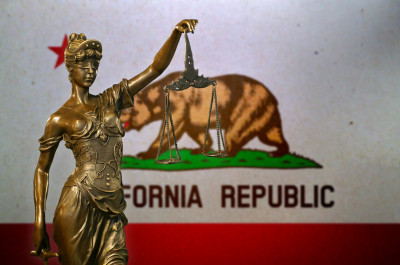New challengers join the fight against AB5
May 23, 2023
 The ongoing legal case against California Assembly Bill 5 (AB5) carries serious implications for the future of the transport industry. AB5, also known as the “gig worker bill,” would reclassify thousands of independent drivers as fulltime employees. This change could send shockwaves throughout the industry by undermining profitability and the freedom of independent drivers to remain as contractors.
The ongoing legal case against California Assembly Bill 5 (AB5) carries serious implications for the future of the transport industry. AB5, also known as the “gig worker bill,” would reclassify thousands of independent drivers as fulltime employees. This change could send shockwaves throughout the industry by undermining profitability and the freedom of independent drivers to remain as contractors.
Many groups have risen up to challenge the legality of AB5. To understand the current status of the ongoing legal battle, let’s examine some prominent cases against the legislation currently working their way through the courts.
California Proposition 22 recap
California Proposition 22, also known as Prop 22, was a ballot measure in the state of California during the general election on November 3, 2020. It was a response to AB5, which aimed to classify gig economy workers, such as drivers for ride-hailing and delivery companies, as employees rather than independent contractors. Prop 22 passed with 58.3% of voters in favor.
Proposition 22 was specifically focused on app-based drivers for companies like Uber, Lyft, DoorDash, and Instacart. It sought to exempt these drivers from being classified as employees and instead establish them as independent contractors, thus allowing them to continue working with the flexibility they had as contractors without government overreach.
The ballot measure was supported by these app-based companies, who argued that reclassifying their drivers as employees would lead to increased costs, loss of flexibility for drivers, and potential negative impacts on their business models. They heavily funded the campaign in favor of Proposition 22, making it one of the most expensive ballot measure campaigns in California’s history.
Are new legal challenges against AB5 likely to succeed in court? Watch the latest episode of the Stay In Your Lane Podcast to learn more.
“Some have said Uber and Lyft essentially paid $200,000,000 to get their own law,” attorney Thomas Kern says of the effort that got Prop 22 on the ballot. “Certainly, that’s a biased opinion. It was approved by 60% of California voters, so obviously people liked it.”
Opponents of Proposition 22, including labor unions and driver advocacy groups, argued that classifying drivers as independent contractors deprived them of essential employee benefits and protections, such as minimum wage, overtime pay, workers’ compensation, and unemployment benefits. They argued that the measure allowed these companies to avoid their responsibilities toward their workers.
Prop 22 became state law after passage in November 2020, was challenged in California state courts in 2021, and was upheld on appeal in 2023. As a result, app-based drivers in California continue to be classified as independent contractors, with some additional benefits and protections provided by the measure, such as minimum earnings guarantees and vehicle insurance coverage. This carveout sets a precedent that could be used to similar advantage for truck drivers. It also highlights the popular support among voters for these types of exceptions.
The Olson Case
The Ninth Circuit Court of Appeals recently allowed a lawsuit challenging AB5 to proceed on the grounds that it violates the Equal Protection Clause. The case, Olson v. California, centers around the so-called “ABC test” for determining independent contractor misclassification under AB5. The ABC test presumes an employment relationship unless the hiring entity can prove that the worker is free from control and direction, performs work outside the usual course of the hiring entity’s business, and is engaged in an independent trade or business.
While AB5 was amended to exempt certain categories of workers, such as certain gig economy workers, others were not given a similar exemption. The plaintiffs in the Olson case argue that this disparate treatment violates the Equal Protection, Due Process, Contract, and Bill of Attainder Clauses of the U.S. Constitution. Initially, the district court rejected their arguments, but the Ninth Circuit revived the Equal Protection claim on appeal.
The Ninth Circuit found that the plaintiffs had plausibly alleged that AB5 violates the Equal Protection Clause for app-based ride-hailing and delivery service workers. The court noted that the inclusion of exemptions for certain gig economy workers in a piecemeal manner supported the plaintiffs’ claim that ride-hailing companies were singled out unfairly by the legislature. The court also considered legislative remarks targeting ride-hailing companies, suggesting possible bias was behind the legislation.
“At best, it’s favoritism. At worst, this is corruption,” says Kern of the way AB5 exempts certain job categories in a seemingly arbitrary manner. “Why are these certain groups exempt without any real reason? It’s unfair essentially.”
Following the Ninth Circuit’s decision and the significance of AB5 in the future of the gig economy, further developments in this case can be expected.
What does this mean for truckers?
Like rideshare drivers, the fate of independent contractors in the trucking industry will be affected by the outcome of AB5. Reclassifying contractors as full-time employees could do serious damage across the industry by eliminating the independent contractor model. In addition to the litigation outlined above, the CTA’s case against AB5 on behalf of the trucking industry is ongoing. Triple T Transport and the Stay In Your Lane Podcast are closely following this case and will share any developments as they unfold.














